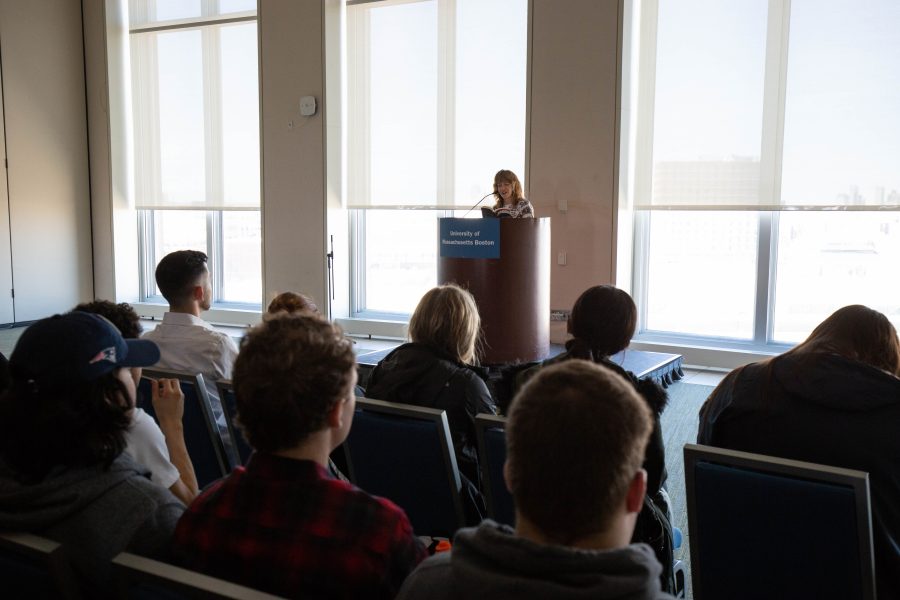Thursday, April 4, 2019—Courtesy of English department administrator Renata Tutko, award-winning author and poet Michelle Tea came by the University of Massachusetts Boston campus to speak more about her recent book, “Against Memoir: Complaints, Confessions and Criticisms.” This autobiography is a collection of essays in which she shares her perspectives and experiences as a queer feminist and how the intersectionality plays a part in her everyday life. Tea has written many books which have detailed her experiences and the experiences of the characters that she has created of seeing the world through queer eyes. Tea is a recent recipient of the 2019 PEN/Diamonstein-Spielvogel Award for the art of the essay for her work on “Against Memoir.” Tea also won the 2000 Lambda Literary Award for her novel “Valencia,” which was adapted into a film in the summer of 2013.
The event was opened by Tea’s reading of a section from the book in which she took the audience through the experience of watching President Trump get voted into office along with her friends who were readily prepared for absolutely any other outcome. Further along in the reading, Tea describes coming across the now infamous poem, “The City to a Young Girl” by Jody Caravaglia in which the then 15-year-old poet explicitly describes being subject to male gaze in her town. The poem was then found and published in college literary magazines and even placed in a youth writing anthology titled “Male and Female Under 18.” The poem was then published and made available by the educational publication Prentice Hall and then ended up on high-school shelves across the country, one of which was Chelsea High School. Parent complaints to the Chelsea school board landed the piece in court for a rather high-profile case regarding the piece’s right to be on the shelves of school public libraries. There was then a dramatic reading of the poem done by Caravaglia herself, who had also come along. She cited both Gwendolyn Brooks and Bugs Bunny as her inspirations. Tea then continued to read from the book in which she celebrated Caravaglia’s courage and use of language calling the poem, “Slam poetry decades before slam poetry even existed.”
After the main chunk of the event, there was a Q&A with Tea and the audience. Tea answered questions about her life as a career author and the things that she did in addition to her career in order to support herself. She answered to one student: “I don’t really make my living of writing. I make my living off of piecing this and that together.” She explained a time in her life when she was feeling very distant from her family and her partner, which prompted her to come to Boston to stay with a friend. While in Boston, she had read a lot of different authors which had inspired her to write more. She had felt liberated to know that she didn’t need to have a qualification in order to be a writer. She also spoke of her time in San Francisco where she came in contact with the very open and supportive poetry scene. There she met many friends who were avid poets and writers themselves; Tea says that her friends were what motivated her to keep writing. Tea’s collaborations in San Francisco eventually led to the Sister Spit performance art collective which she had cofounded with Sini Anderson in 1994. Sister Spit is still active and performing, albeit with different members and recently finished their first tour of 2019 in March. Tea also shared some advice with aspiring writers, “You have to fight for your time … You need to be ruthlessly protective of your time and your space because no one else will.”
In an interview Tea spoke about her experiences at UMass Boston which lasted for two semesters. She specifically remembered the presence of the queer student alliance on campus which provided her with some of her first experiences with other queer people and activism. She also spoke about an eccentric professor who helped her control the speed of how she read out loud. When asked about her expertise on tarot, she says that one thing that it taught her about life is that there are elements of life that don’t make a lot of rational sense but remain true nonetheless. “There should be no reason why I should be able to read someone’s tarot cards and it works. But it does.” She also says that a session of tarot can be a good therapy session. Tea wasn’t just an author. In the 90s, she had been the drummer for two bands, Dirt Bike Gang and Death Card 13. “I’ve still always wanted to be in a band. I bought drums four different times.”

